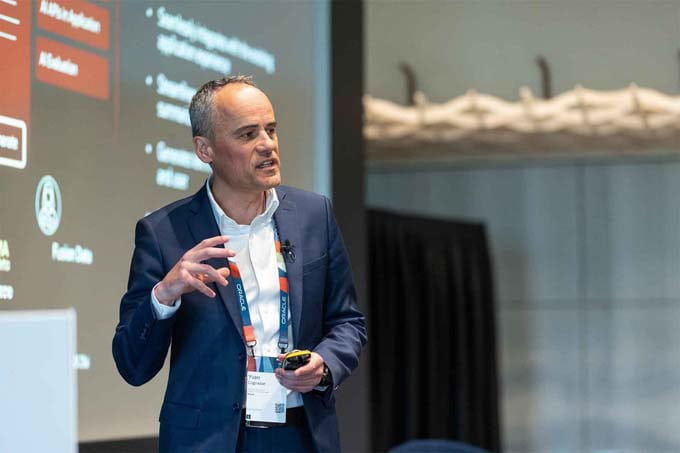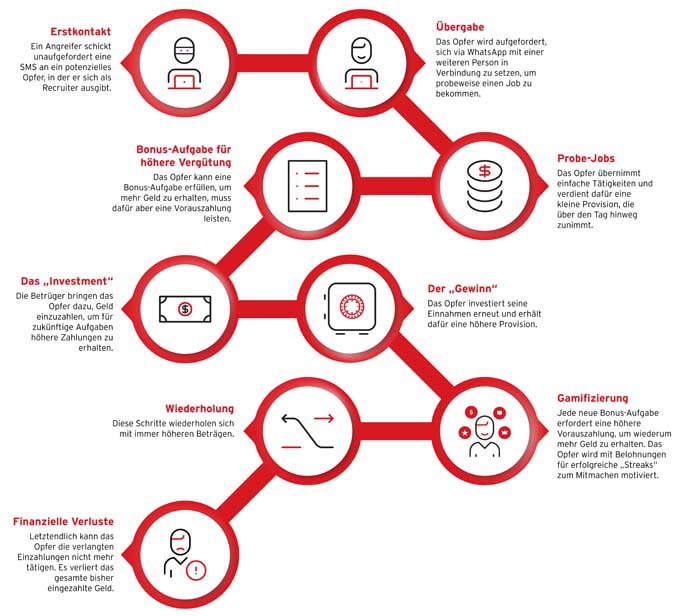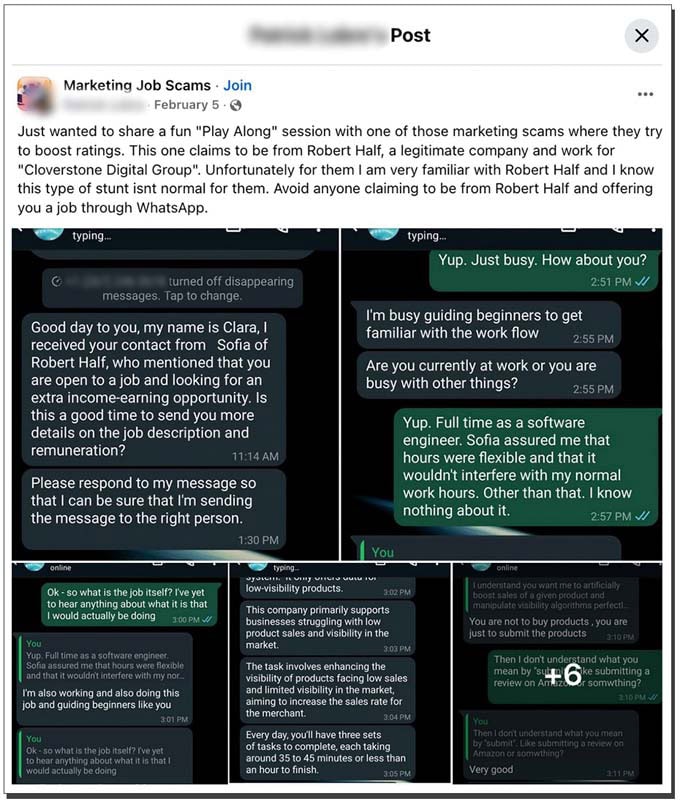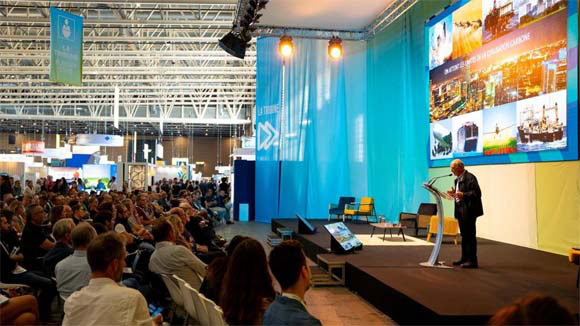How Lobeco turns customers into digital champions
With strategic precision, creative enthusiasm and a winning mentality, Lobeco has developed from a social media specialist into an international player in eleven years. The claim is clear: customers should not just keep up - they should play in the digital premier league.
When you walk into Lobeco, you immediately sense a breath of cabin air before the Champions League final. Founder Lorenz Beringer, once Head of Social Media at FC Bayern, and Managing Director Sebastian Iffert, also an FC veteran, have built up an agency that combines strategy, creation and technology like a coach combines tactics, team spirit and talent. Today, the 130-strong team works at four locations - Munich, Zurich, Berlin and Shanghai - to turn clients into digital champions.
The sporting DNA characterizes the working style: clear roles, high tempo, well-rehearsed processes. In-house production of all content is the standard here, not the exception. Tailor-made solutions such as the AI tool "CorporateGPT by LOBECO" are created in the AI Lab, while formats ranging from live streams to AI-supported video series are produced in the in-house studio. Workshops, training programs and the AI driving license enable customers to play confidently themselves - using state-of-the-art digital gaming systems.
Game system for sustainable success
Sebastian Iffert, Managing Director, is primarily responsible for the further development of the Swiss location. "At the same time, I look after the Automotive, Financial Services and Healthcare divisions." He describes the collaboration with customers as sparring at eye level: defining goals together, shaping paths, learning continuously. Lobeco's USP: in-depth social media expertise combined with the ability to combine organic, paid and data into a powerful unit. For Iffert, "lifelong learning" is not just a motto, but a must in order to achieve long-term success in a dynamic market.
Creative playmaker qualities
Carsten Jamrow, Creative Director, moved from Jung von Matt to the Lobeco team in 2024 - a completely new start for him. "Above all, we want to become much stronger conceptually," he says. Jamrow focuses on brand-specific trend integration and speed: seizing trends while they are hot and implementing them in a way that fits the brand personality. With content produced in-house, Lobeco can react on a daily basis - an advantage that often makes the difference between a hit and a miss in social media.
"Above all, we want to become much stronger conceptually" - Carsten Jamrow
Lobeco's customer portfolio was one of the reasons for Jamrow to make the switch: Lidl in Switzerland as an extremely large customer, Paulaner as a traditional brand with an international character, BMW and BMW Motorrad as well as sports customers such as FC Bayern and Bayer Leverkusen. The challenge with these customers is to develop something unique for each channel that gives it an additional push. "It's not enough to simply have a creative idea that fits every channel. These days, it's so important to develop your own ideas on TikTok, to see what works for the target group on Instagram and not just to bring the classic idea to the channels."
Local class, international tactics
Claudine Caviezel has managed Lobeco's Swiss office since 2025. In Zurich, she combines local expertise with international digital strategy - close to the customer and attentive to the linguistic and cultural peculiarities of Switzerland. Creative storytelling is not a buzzword, but a lived practice: creativity and data flow into each other from the idea and strategy to implementation and playout. The close collaboration with the headquarters in Munich is characterized by plenty of scope for local solutions. Claudine Caviezel brings a holistic view from her international corporate experience - and a sense of rhythm that stems from another source: her passion for electronic music, which remains to this day. As a teenager, she experienced the beginnings of the Zurich techno scene, hosted television programs about DJs and techno and still thinks in beats when structuring campaigns. This "sense of rhythm" also characterizes her dealings with clients, who are increasingly expected to perceive social media as a C-level topic - as a business driver, not just a communication channel, as she says in the m&k video talk.
"We build up expertise in the companies" - Claudine Caviezel
For Claudine Caviezel, anchoring social media as a holistic strategy tool for clients is a major concern. Lobeco Switzerland meets this with a clear profile: eleven years of experience as a pure digital agency, sound industry knowledge and a team enablement approach that builds up know-how sustainably in companies. Whether workshops, data monitoring, product launches or campaigns - the Zurich team complements the internal resources precisely. And it is growing - healthy, customer-oriented and with the aim of being the partner for Swiss brands that recognizes trends without losing sight of the brand essence.
Double pass between Zurich and Munich
Working closely with Claudine Caviezel, Frederik Paschko is driving interdisciplinary collaboration between the headquarters and the Zurich site - with a hybrid management approach that closely interlinks the two teams. Paschko heads the Consumer Goods & Sports division at Lobeco. The sports science graduate has held various positions at Lobeco since 2018 and today wears the captain's armband for clients such as Lidl Switzerland and Swiss-Ski. For Paschko, lessons learned from the consumer goods and sports sectors complement each other perfectly; both fields are based on very similar tactical orientations: Sport is about arousing emotions, building up coverage and retaining fans in the long term - precisely these mechanisms can be transferred to consumer goods. Sponsorship acts as a hinge between the two worlds by embedding brands in emotional worlds of experience.
Paschko's understanding of consulting follows a clear principle: building close customer relationships, creating trust, identifying problems together and not putting together standard packages, but developing tailor-made and successful tactical plans. He makes decisions based on sound data and always at a strategic level - with the aim of not only supporting customers, but also empowering them in the long term. "We use stories and relevant content to create awareness, emotionalize and activate target groups - and thus achieve real business impact for our customers," he says.
Head coach with Champions League aspirations
"Turning our customers into digital champions is our aspiration," is Lorenz Beringer's game plan. Beringer founded Lobeco in 2014 after moving from FC Bayern with the motivation to take brands to "Champions League level". The second location in Shanghai followed early on - to recognize trends that often only arrive in Europe years later. "This is super relevant for all our customers in Switzerland and Germany." His changemaker philosophy can be seen in projects such as BMW Motorrad, where Lobeco rejuvenated an older target group, or Swiss Ski, whose digital transformation the team has been supporting for years. For him, analysis, a tailor-made strategy and rapid implementation are the game plan for winning titles. He took a toolbox for change management and leadership with him from his Executive MBA in St. Gallen, which is still the basis of his work today.
"Turning our customers into digital champions is our aspiration" - Lorenz Beringer
The values that also characterize Lobeco form another important foundation: Team spirit, motivation and performance orientation - principles that he not only promotes within his own team, but also lives by when working with customers. "We never see ourselves as individuals, but always as a team that requires different talents." He sees social media as the engine of modern brand management - and his aim is to build the perfect social media engine for every brand: powerful, precisely coordinated and ready to accelerate growth at all levels. For him, the Zurich location is a strategic key to combining customer proximity in Switzerland with international clout.
Brand identity with gaming intelligence
Andreas Torwesten, Director Brand Building, ensures that the social media presence is closely aligned with the brand strategy. Fewer channels, but excellently used - as with BMW Motorrad on TikTok - is his motto. Data provides the foundation, creativity decides the game. "It's not enough to simply bring a classic idea to the channels - each channel needs its own creative," says Torwesten. His recipe for success: test new platforms early on, as he did with TikTok for BMW Motorrad in 2019, and learn from successes and failures alike in order to build the largest channel in the automotive industry.
The view of the pitch from the outside
As the new Managing Director, Dirk Huefnagels brings decades of marketing experience to the table, including his time at HypoVereinsbank and Otto and his work with top creative agencies such as Wieden+Kennedy. He expects agencies to have in-depth industry knowledge and the ability to get clients in front of the wave.
"I had always planned to simply switch sides" - Dirk Huefnagels
In sports sponsorship, he does not think in terms of image transfers, but in terms of concrete business impact - and uses the example of FC Bayern to show how emotional fan loyalty leads to measurable business results. For Huefnagels, it is crucial that agencies understand the client's business model, remain curious and anticipate trends - only then can they offer real added value.
AI as the new playmaker
Niklas Ben El Mekki, Head of AI & Video, manages the combination of moving image content and AI in the in-house studio. CorporateGPT, chatbots, personalized videos - this is where formats are created that combine speed, quality and cost optimization. The AI driver's license prepares customers for the European AI Act. "For the first time, high-quality AI video creation is possible in hours instead of weeks," he says, which sounds like a double whammy in injury time. Lobeco's innovative CorporateGPT platform is hosted entirely in Germany and offers companies data security with full AI functionality. In workshops, his team provides targeted training in "AI thinking" - the ability to use AI creatively and strategically and to work more effectively in the process.
Conclusion:
Lobeco acts like a well-coordinated top team: clear roles, a common goal, constant analysis and the courage to try new moves. The mixture of sporting DNA, digital expertise and technological innovation turns customers into contenders for the title in the digital premier league rather than followers. And with an AI lab, TV studio, workshops and experience from projects ranging from Swiss Ski to BMW Motorrad, the team not only has the game plan for today - but also for the coming seasons.








 Weber brings together well-known personalities. Rolf auf der Maur from Vischer brings legal expertise. Remo Baumeler from Audienzz strengthens the data sector. Tom Hanan from Webrepublic represents the agency scene.
Weber brings together well-known personalities. Rolf auf der Maur from Vischer brings legal expertise. Remo Baumeler from Audienzz strengthens the data sector. Tom Hanan from Webrepublic represents the agency scene.



















 The Swiss family business Avesco, now in its 6th generation and active throughout Europe in the fields of construction machinery, energy systems and construction technology solutions, has developed a new brand positioning together with Day Partners. The aim was to formulate the company's own entrepreneurial attitude more precisely, to sharpen its profile in the market and to further develop its communication with customers and potential employees in a coherent manner.
The Swiss family business Avesco, now in its 6th generation and active throughout Europe in the fields of construction machinery, energy systems and construction technology solutions, has developed a new brand positioning together with Day Partners. The aim was to formulate the company's own entrepreneurial attitude more precisely, to sharpen its profile in the market and to further develop its communication with customers and potential employees in a coherent manner.


 Walthert and his team of around 70 people have been responsible for the successful marketing, sustainable branding and high-profile campaigns of Digitec and Galaxus for years. A large part of the work is done in-house. The team regularly uses unconventional approaches - with demonstrable success: the company's turnover and brand awareness have grown continuously.
Walthert and his team of around 70 people have been responsible for the successful marketing, sustainable branding and high-profile campaigns of Digitec and Galaxus for years. A large part of the work is done in-house. The team regularly uses unconventional approaches - with demonstrable success: the company's turnover and brand awareness have grown continuously.